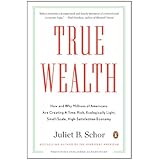
Average Reviews:

(More customer reviews)Though never having heard of Schor previously, when she was recently interviewed on National Public Radio, her ideas and perspectives immediately piqued my interest. What Schor offers, in a nutshell, is a preview of important changes that have begun to unfold, and will continue to do so over the course of this century. While books on globalization, such as Thomas Friedman's The World is Flat, capture one piece of the emerging puzzle, Schor draws our attention to another critical dimension. Namely, she recognizes that the twenty-first century will not only be characterized by postmodern practices, such as the global marketplace, but also premodern ones. The latter includes things such as a rediscovery of small farms and gardening, a renewed emphasis on local trade, and diminished reliance on mass markets and disposable goods. At first blush, it is easy to be skeptical of such notions, which might seem hopelessly romantic or even naive. Viewed more carefully, however, Schor's treatise actually appears more realistic (at least from my perspective) than those who view globalization as the ultimate panacea.
Like many others, Schor recognizes that the middle class is quickly becoming a thing of the past. And while some pundits are quick to use the "haves" and "have nots" dichotomy for describing the emerging socioeconomic picture, Schor sees a way out for the "have nots." What this requires is a paradigmatic shift in perspective.
Over the past half century or so, we have become increasingly dependent on the financial markets as a means of growing and acquiring wealth. This has been driven by consumer debt and consumerism, practices that are proving unsustainable and ecologically harmful. Schor's work is important in recognizing that the problem is not so much the way we divide stimulus money or regulate the banks; it goes much deeper than that. Rather, the issue is where we've come to place our trust and our values. Instead of building social capital and investing in our local communities, we've sold the farm in order to chase the pot of gold promised by the market economists.
As we now stand in the valley between our collective future and a difficult world economy, Schor offers the reader a vision for a better life. Since many jobs of the past are not soon returning, we can either opt to remake ourselves or to continue to try to patch a globally unsustainable way of life. While a permanent reduction of purchasing power is a difficult thing to accept, Schor points out that a life of plenitude is available through a redevelopment of community life and an emphasis on sustainable practices. While no one knows precisely how this will appear in the postmodern world, Schor offers important starting points for those interested in rethinking both their personal and collective future.
The bottom line: We have come to a critical point in human history. We can either continue to cling to the dreams of the past, or, we can find the courage to build a new future. The former requires that we continue to place all our trust in massive and often volatile systems, while in the latter, we start turning to our neighbors, innovate new local practices, and work more from the ground up. To thrive and survive, we must harness global wisdom and ingenuity toward the building of an interconnected network of quasi self-sustaining communities. Schor's work is a move toward achieving the right balance between the global and the local.
Click Here to see more reviews about: True Wealth: How and Why Millions of Americans Are Creating a Time-Rich, Ecologically Light,Small-Scale, High-Satisfaction Economy
A groundbreaking statement about ecological decline, suggesting a radical change in how we think about consumer goods, value, and ways to live.
In True Wealth , economist Juliet B. Schor rejects the sacrifice message, with the insight that social innovations and new technology can simultaneously enhance our lives and protect the planet. Schor shares examples of urban farmers, DIY renovators, and others working outside the conventional market to illuminate the path away from the work-and-spend cycle and toward a new world rich in time, creativity, information, and community.

0 comments:
Post a Comment